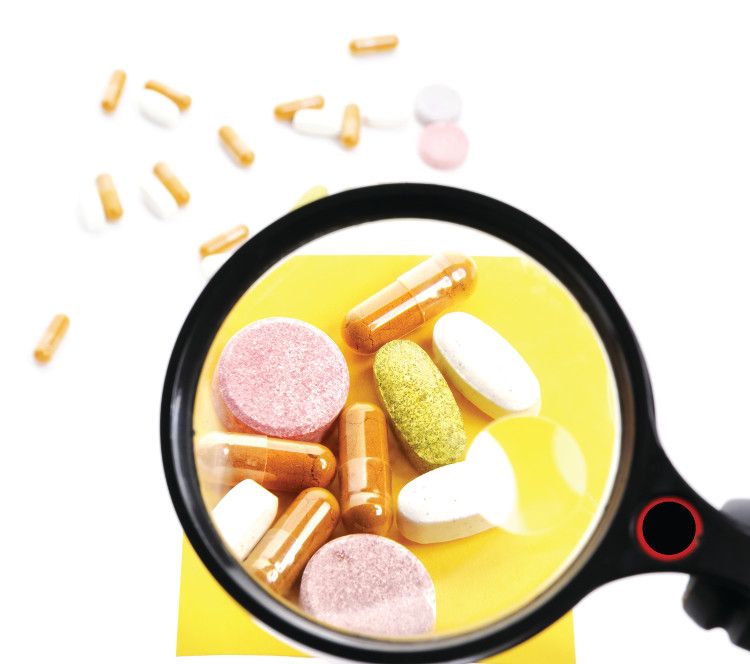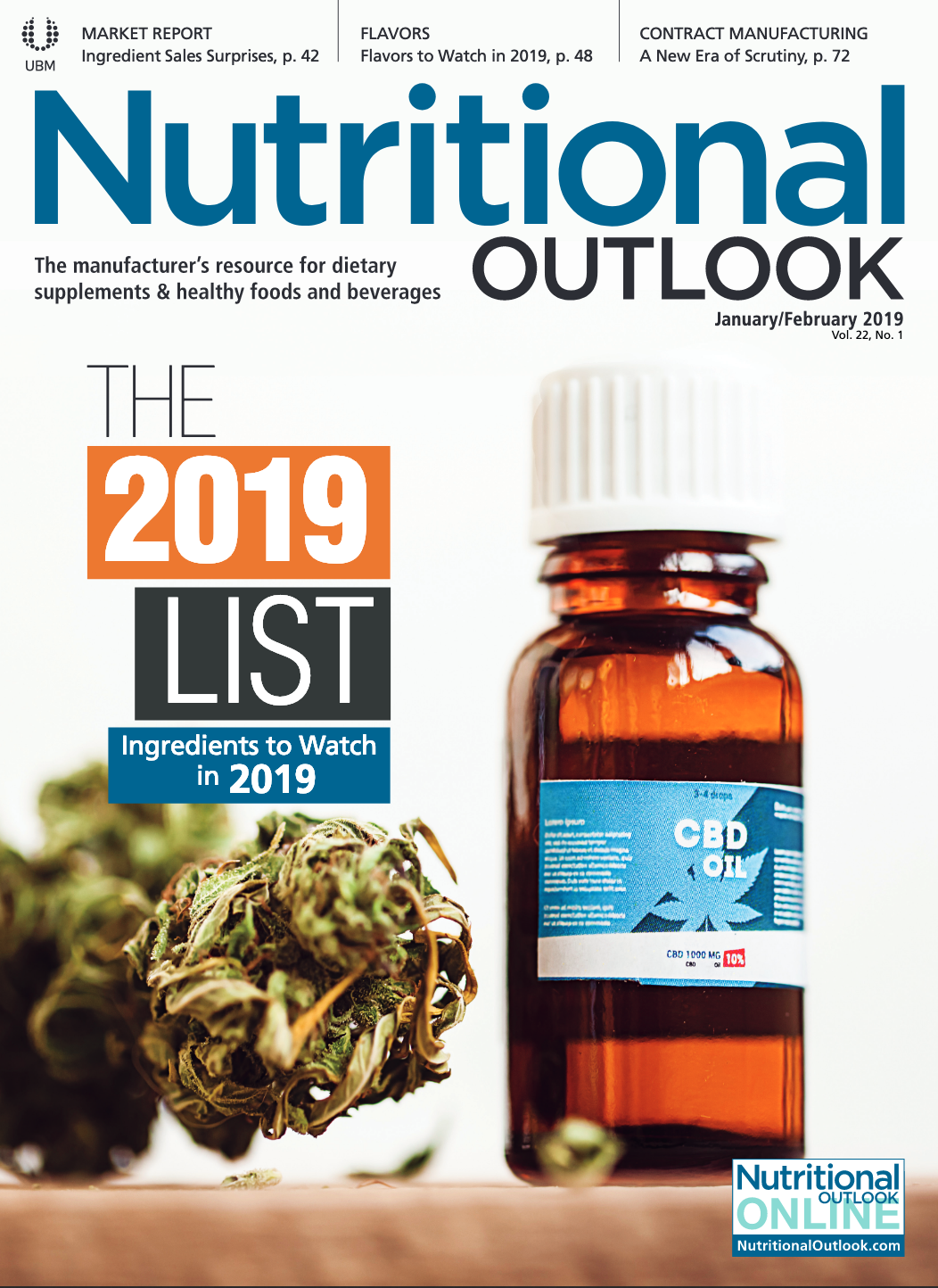How are contract manufacturers dealing with increased scrutiny in the dietary supplement industry?
How are contract manufacturers dealing with increased scrutiny and demands for traceability, transparency, and quality control?
Photo © AdobeStock.com/fcxphotography.com

As demand grows for higher levels of traceability, transparency, and quality control, dietary supplement and food/beverage manufacturers are feeling the heat-as are the contract manufacturers they work with, as the pursuit of quality extends across the supply chain. In this roundtable, we spoke to companies about the challenges and opportunities contract manufacturers face in this new era.
Nutritional Outlook: Is scrutiny of the dietary supplements market increasing? Can you contrast how much higher or lower this scrutiny appeared to be in 2018, or what you expect to see in 2019, compared to years past? Where is this scrutiny coming from?
Justin Bath, President of Biovation Labs LLC (Salt Lake City, UT): Yes, scrutiny is increasing from almost every angle-from regulators who are pushing for more visibility into ingredients and production processes, to customers who are pushing for more transparency in what is in these products and what the products will do for them. In past years, there has not been the media attention given to the general industry. Previously, any issues weren’t turned into headline news, but now the media has really started to make criticism and such much more visible. This, in turn, makes customers more aware, which creates more pressure on government and regulators to get involved-which then increases media attention, creating a continuous loop of higher scrutiny. I believe it started with regulation becoming more organized, which provided a baseline to measure what is considered good and bad. From there, the media loves a good story; the more potentially critical the story is, the better the headline. This creates more customer attention, which then turns into more political pressure. It is a continual loop that will grow as the industry and its reach grows and matures.
Is this scrutiny of the industry justified? As a whole, does the dietary supplements industry need to increase its quality control?
Eugene Ung, CEO of Best Formulations (City of Industry, CA): We believe the scrutiny is justified given that the products we manufacture are ingested by millions of people every day throughout the world, and people are taking these dietary supplement products to help improve their health, so there is an implied promise and trust of the brand/manufacturer that the customer has. As a whole, the dietary supplement industry has increased its quality control, but there is a wide range of companies who have robust quality systems, who have minimal quality control, and everything in between. The industry needs to continue to improve in this area to maintain the trust of the consumer.
Justin Bath: Yes and no. Most of the players in the industry are doing a great job of providing safe and effective products. However, with growth comes less honest people who are not as altruistic in their goals. Some of these players make the scrutiny justified. Also, as the industry grows and impacts more people’s lives, it is natural that it would gain more attention from regulators, who have the difficult job of ensuring consumers have access to safe and effective products.
Just like any innovative industry, as products become more complex, they require a more structured environment to grow. Our industry is no different. Growth cannot come without an enhanced ability to produce complex products that meet customer expectations. While I believe most of the players in the industry take quality control extremely seriously, we should take every opportunity to ensure everything we do provides for the best and safest product possible.
Rui Yang, Chief Strategy Officer, Sirio Pharma (Shantou, Guangdong, China): We have certainly seen higher scrutiny from regulators and customers, but I don’t think it’s a case of “being justified.” Rather, the industry is ensuring it provides the best quality we can. Most contract development and manufacturing organizations, certainly those selling into Europe and the United States, have embraced this. For instance, at Sirio, we have an open-door policy and operate in a permanent state of inspection readiness. It’s not enough to simply want to pass an inspection or audit; what you need is a year-round quality culture running through the company. Over the next few years, transparency is going to become increasingly important, and we expect to see more visits from FDA as well as other international certification agencies and customers.
Paul Hwang, Vice President of Quality and Regulatory, Captek Softgel International (Cerritos, CA): As an industry, we have a responsibility to keep our consumers’ safety and protection a priority as we put forth products that our consumers are ingesting for health and wellness. As a whole, many in the industry are quality-minded and have such as priority; however, a few bad actors could taint/distort such reflection of the industry. Therefore, as an industry, we have the need for continued vigilance, self-regulation, and holding ourselves to increasing standards.
Christen Davis, Director of Quality, and Randy Flick, Quality Assurance Manager; Lonza Consumer Health & Nutrition (Basel, Switzerland): Yes, we’ve certainly seen increased levels of scrutiny from multiple channels throughout the supply chain, particularly from regulators such as FDA. In turn, we’ve seen a drive for some of our customers to become more sophisticated in their quality metrics and quality processes. Many of our customers are also looking to us to support them in navigating the changing landscape, and as such we’ve also seen increased levels of scrutiny from these customers to help them do so.
The dietary supplements industry as a whole is constantly evolving, and the players in the industry understand their place in the healthcare continuum to support consumer health and wellbeing. They also understand that adhering to regulations and doing things the right way is essential-indeed, there is often a great deal of internal scrutiny within companies to ensure that they meet these regulatory requirements. Despite this, it is important that the dietary supplements industry remains agile and continues to adapt to the changing consumer and regulatory demands.
What should the role of the contract manufacturer be in achieving better quality control? Also, how should responsibility for quality control be spread throughout the supply chain?
Justin Bath: The contract manufacturer plays a central role in quality control, as they can ensure the product being produced meets the standards they are seeking to obtain. Everyone has a role [in responsibility for quality control], from the farmer growing the plants to the processing plants turning the plants and minerals into raw materials. It is essential that each piece in the chain be accountable for producing safe products. Finally, the company having the products produced also has the responsibility of holding the manufacturer to the highest standards by working to ensure they understand the product they are producing and how the end consumer is using it.
Paul Hwang: Captek Softgel International understands that the role of a contract manufacturer is to be a true partner with the product marketer. This partnership is one of clear and aligned understanding of the product and respective roles and responsibilities of parties, leading to appropriate establishment of qualification and quality control through the supply chain. Upon such establishment, the contract manufacturer is then able to establish cognizant consistency with upstream suppliers and vendors, who in turn will be required to do the same. This permits the propagation of ensuring aligned and a more effective quality-control system for the entire supply chain. As each link contributes towards the integrity of quality control in the respective supply chain, we’re able to enforce responsibility throughout the process-from manufacturing to consumer.
Eugene Ung: Having an understanding of expectations throughout the supply chain is critical to achieving better quality control. Generally speaking, the contract manufacturer is in the middle between the supply chain and the brand/consumer, so the contract manufacturer plays a critical role. This is accomplished by having clear expectations with the brand/customer as to what the finished product specifications are and who is responsible for what. With this information, the contract manufacturer can go back up the supply chain to ensure the raw-material suppliers are providing materials that can meet these finished-product specifications. This process does take time and scrutiny to set up, but without good, clear finished goods and raw-material specifications, achieving better quality control is left to chance.
Christen Davis and Randy Flick: Contract manufacturers can contribute to improved quality control by helping to streamline the process; for instance, having certified supplier programs and being a certified vendor enables brand owners to utilize quality systems that are already inherent in the contract manufacturing organization to avoid duplication of testing and other activities. For this reason, selecting the right contract manufacturing organization is essential-not only from an innovation perspective but also for ensuring quality.
Visiting the contract manufacturing organization site to view the facilities, meet the people, and understand the quality systems in place is invaluable in helping to be confident that the products they are developing meet the fit, form, and finish that they and their consumers expect. This is where Lonza has been able to stand out in the consumer health landscape: we’ve evolved to be able to offer not just a service but also a consultative approach, particularly for the growing number of virtual companies on the market today, which often have little experience in setting up quality systems. We now play a dual role to make sure that we are manufacturing high-quality products with the best output for the consumer. We also collaborate with brand owners to help ensure that they are equipped to be successful regardless of their requirements, whether this is setting up stability programs for products or understanding the documentation required by FDA and other regulatory authorities.
How are contract manufacturers collaborating more closely with customers, raw-material suppliers, testing labs, etc., to achieve higher levels of quality control?
Justin Bath: First, by being more selective of who we do business with, and second by selecting customers who have the same standards for the final product quality. It is essential that all the partners in the supply chain have the same goals and attention to detail. Once everyone is on the same page as to the requirements, it makes producing the product much easier.
Paul Hwang: Captek Softgel International works closely with customers, raw-material suppliers, testing labs, and all points along the supply chain to achieve true partner status. We take great care to internalize the scope and clarity of the product, requirements, specifications, roles, and responsibilities-all of which lead to more effective quality-control systems throughout the process.
Eugene Ung: A quality agreement between the contract manufacturer and customer is a key starting point to achieve higher levels of quality control. The quality agreement typically will specify who is responsible for what (i.e., who sets the finished-product specifications, who sets the raw-material specifications, who will be testing for what, etc.) so that the expectations are clear. Then it will be up to the contract manufacturer and customer to ensure that they play their respective roles.
Rui Yang: In addition to strictly complying with the requirements of laws and regulations, we also consider the customer’s perspective-in particular, looking at factors that concern our customers or have potential impact on product quality, especially during product development and production. These include having comprehensive requirements and control over the selection of raw materials and suppliers, as well as production. For instance, we will evaluate each raw-material vendor for compliance and qualify each ingredient through tests, including tests for identity, pesticide residues, microbials, and heavy metals. If the materials do not conform to established specifications, they are immediately rejected and replaced. Upon validating the vendor, we will then approve the supplier and continue to actively maintain communication with the supplier to make sure they have a robust track record of delivering safe products. Then, after two years, Sirio requalifies every supplier. Meanwhile, each raw material and finished product can be traced for each client.
Is your company seeing changes in the number of audits performed by its customers or by FDA?
Justin Bath: Yes, audit frequency is increasing, as is audit duration. The FDA is spending more time making sure the cGMP processes are being followed, and it is being less understanding of any noncompliance.
Paul Hwang: The trend in the number of audits by customers has been continuously increasing, and we’ve seen it dramatically more pronounced within the last decade. However, with the industry’s collective effort for self-regulation, and to establish and align to “industry” standards, this trend appears to be leveling off with customers. That said, the FDA’s audits are consistently increasing.
Christen Davis and Randy Flick: Understanding the needs of our customers and raw-material suppliers plays an integral role in defining quality-control measures. For this reason, while we have certainly seen an increase in the length, number, and scope of audits, both from customers and FDA, we also very much welcome them for the constructive feedback they provide. It enables us to make sure that we continue to improve our understanding of the regulations and industry standards, and ensure that both our customers and the team at Lonza are equipped for future FDA audits. We also work with our customers to conduct gap analyses as required, helping to make sure they are also meeting current regulatory standards in the United States and other countries as appropriate.
Furthermore, we work by creating a relationship with our customers to deliver premium products to the market-Lonza’s work with our customer, Ritual, for example, saw us support them to refine raw-material suppliers, modify formulations, and improve ingredient quality in order to better deliver the end product to consumers, with greater transparency and traceability. This is also true throughout the entire supply chain and the wider consumer health and nutrition space; we are seeing more and more brand owners wanting to understand where a product came from, which is why we believe it is essential to have strong working relationships with raw-material suppliers.
Ongoing collaboration with customers also helps contract manufacturers to become flexible enough to create products that are globally compliant to quickly meet customer needs. This harmonization not only helps to fulfill what customers need today, but also helps anticipate what they need tomorrow and supports them to help grow their business globally.
How have contract manufacturers personally seen increased demands for traceability, transparency, and quality control affect their business practices?
Justin Bath: We are required to have better processes, better documentation, and are required to be more educated on all aspects of production. We must be more selective on the type of customers we bring on and the type of products we produce. Today, even marketing language can cause problems for the manufacturer. It is essential that we work with customers who really understand and work to produce the highest-quality products possible.
Rui Yang: One of the primary actions contract manufacturers must undergo is implementing an appropriate and robust quality-assurance infrastructure and being prepared for future changes. So quality, traceability, and transparency approaches should not “affect” business practices; they should be integral and ingrained in everything we do. For instance, we currently employ over 65 people in our quality-assurance team dedicated to on-site monitoring, product release, change deviation, system certification, etc. They oversee all parts of production and sourcing, working closely with the production side and sourcing departments.
It is also important to have strict protocols for incoming, in-process, and finished-product testing. For example, incoming raw materials need to be assessed using validated test methods. Then, during the production process, each batch will go through routine checks to ensure they are fully documented. Once finished, products will undergo release testing and batch record examination.
In what ways is the increasingly global supply chain putting additional demands and requirements on contract manufacturers?
Justin Bath: It is requiring more testing, better vendor qualification processes, and tighter relationships with vendors that can meet the necessary standards. All of this brings with it more cost and longer lead times. It also comes with a positive: better processes, more efficient manufacturing plants, and better educated employees. I do not see this as a bad thing for business long-term, because it will work to separate the high-quality producers from those who are just looking to make a quick buck.
Paul Hwang: The increasingly global supply chain introduces more complexity, an increasing need for continued vigilance and quality control, and a stronger bias for thoroughly qualified and well-established suppliers who have demonstrated quality track records. Also, respectively, there are increasing regulatory requirements to drive tighter controls on such globalized supply chain.
Christen Davis and Randy Flick: We’re seeing more and more customers looking to manufacture and distribute products globally; however, many countries across the world enforce strict regulatory restrictions that must be navigated and adhered to. While manufacturing products that take these restrictions into consideration is a way for our customers to meet local regulatory requirements, creating formulations that are compliant with regulations in multiple countries is a much more cost-effective solution. It also enables contract manufacturers to be more reactive to market needs and adapt to opportunities across the globe. Furthermore, we support our customers in the safety and security of global shipping with a Transportation Security Administration (TSA) certification, which helps to maintain control of the supply chain.
Rui Yang: Globalization has two elements when it comes to contract manufacturers. On the one hand, it means we are sourcing ingredients from wider sources with associated distribution complexity, but it also means we have to maintain a wider range of regulatory certifications and standards. So, in addition to testing the ingredients from each of our suppliers to ensure they are in line with regulations as well as our own standards, which are often at a higher standard than those outlined by regulators, we are also maintaining over 10 internationally recognized certifications. These include UL NPA, GMP, ISO 9001 by SGS, and TGA certifications. Most importantly, our facilities are FDA registered. All of this means that supply chain controls and quality assurance are absolutely at the heart of any global contract development and manufacturing organization’s operations, from ingredients through to final products. We simply could not do business in multiple markets without a centralized quality-assurance approach.
How have you seen quality control change among the raw-material suppliers your company works with?
Justin Bath: They are having to be more diligent in their testing process and in who they purchase from. Small changes now make a big difference.
Paul Hwang: Captek Softgel International has seen quality control change among the raw-material suppliers, with increased awareness of regulatory requirements and now-commonplace testing. We’ve also seen an increase in documentation (both quality and quantity), as well as quicker adoption and willingness to completion. In general, there is an energized investment in quality control: technical, internal capability, and certification.
Rui Yang: Thankfully not so much, as we have benefited from working with suppliers with high existing standards, but we are gaining increasingly detailed documented support.
Please discuss ways in which your company is taking steps to increase quality-control measures-including more documentation, traceability, testing, third-party certification, etc.?
Justin Bath: We believe quality control starts with the inception of the product and its formulation. This causes us to be much more selective of the type of customers we work with. We will not work with customers who don’t care about the quality of their products and are looking for the cheapest solutions possible. It is important that the formulation of the product be well thought out and that the customer requesting the product have a desire to produce a quality product. That drives everything for us. If you can start with a high-quality formulation and a customer that wants to produce a high-quality product, the rest of the process falls into place. We follow strict documentation and traceability controls already, and we are consistently audited by third-party ceetification partners. Everything starts with the paradigm of the formulator and the customer having high standards.
Paul Hwang: Captek Softgel International has a long history of continuous investment and improvement in documentation, third-party certifications, and testing and manufacturing capabilities-both in quantity and quality. We adhere to the principles of due diligence and transparency.
Rui Yang: We are constantly looking at ways to improve transparency for our partners and provide visibility through the entire supply chain. For example, for each raw material, we assign a specific material code that allows Sirio to trace it back to the supplier during an audit or product recall. Sirio also retains samples of each raw material and finished product for one year after the product’s expiration date. Batch records are maintained for three years from the expiration date.
One of the major advantages we have at Sirio is that we also have an independently certified, state-of-the-art analytical center, which has a broad range of capabilities, including high-performance liquid chromatography, gas chromatography, gas chromatography–mass spectrometry, inductively coupled plasma mass spectrometry, liquid chromatography–mass spectrometry, atomic absorption spectroscopy, and infrared spectroscopy testing, just to name a few. This means that we have long been able to validate each and every batch of finished product and raw material and have extensive experience in transferring and developing custom test methods.
How have contract manufacturers personally seen increased demands for traceability, transparency, and quality control affect the price of doing business?
Justin Bath: The price of testing impacts the price of the product, but literally everything is affected by these demands. Working with suppliers who have the right documentation adds to the price of the raw material, which increases the cost of the product. With that said, I believe that running a high-quality process also helps bring down the cost. If an operation is set up to efficiently run its process, traceability and transparency can and should be built into the process, and it can bring down many of the costs of operations. So, while the price can be impacted, in a negative way, there are also a lot of positive benefits we get out of it, because the process has been carefully engineered and structured to ensure high levels of consistency and efficiency. I strongly believe that quality control facilitates a highly productive manufacturing environment and long-term profitability.
Do demands for newer kinds of delivery forms or difficult-to-work-with ingredients make quality control more difficult?
Justin Bath: They can impact how quality control works, and can make the quality-control process more complicated, but not always. I would say the rule of thumb would be that the more complex the ingredient or delivery form is to manufacture, the more important it is to develop a quality-control process that can identify weaknesses in product quality.
How can contract manufacturers increase quality-control measures while still remaining profitable? How can contract manufacturers maintain their cost margins on production, efficiency, or even sustainability?
Justin Bath: It is all in the process. I believe technology, if implemented correctly, can really help. Also, having the right people managing the process is key. A high-quality manager with the right experience can really make complex quality-control measures very efficient. [Contract manufacturers maintain their cost margins on production, efficiency, or even sustainability] by choosing the right customers who understand the importance of product quality and who have the right attitude toward the required balance between cost and quality.
Christen Davis and Randy Flick: With customers becoming more sophisticated and increasingly demanding transparency and traceability throughout the supply chain, contract manufacturers must adapt to become more diligent-this will not only help to ensure security of the supply and the safety and quality of the product, but will also help contract manufacturers navigate the challenges presented by new delivery forms and difficult-to-work-with ingredients. This is especially important with the growing prominence of custom products in the consumer space; when working with custom products, preparation and strong foundations are key. For this reason, we have expanded our science and innovation expertise within our quality-control department so our customers have confidence in our capabilities. Additionally, Lonza’s heritage as an engineering company allows us to be very innovative and responsive not only to customer needs, but also to the changing regulatory landscape. Lonza is committed to making the necessary investments to ensure that the products we create are safe, compliant with global regulations, and provide the transparency and traceability that suppliers, brand owners, and consumers expect.
In what ways might contract manufacturers see ROI regarding any measures they take to increase traceability, quality control, testing, etc.?
Justin Bath: To do traceability and quality control right, it must be built directly into the process. ROI comes from reducing the number of touchpoints a product must go through, or from not having to take back product that is out of spec and reworking it-or even worse, having to recall product because it is unfit for sale or has caused harm to someone. In the end, doing something right the first time generates a positive ROI, and that is the real end goal of traceability, quality control, and testing programs: putting out the best product with the least number of touchpoints and completing a product right the first time.
Rui Yang: Put simply, building quality should never be viewed as a cost, as it helps maintain the most precious commodity amongst consumers and customers: trust. Yes, purely in terms of margin, there are costs, but good practices reduce risk and protect the customer’s brand. Brand reputation is priceless for customers, and once destroyed, it cannot be recovered. Therefore, the increased cost is akin to protection for customers, like “insurance” for product quality, which is very worthwhile indeed.
What is the attitude of contract manufacturing customers in terms of understanding the higher costs, longer lead times, etc., that come with increasing quality control?
Justin Bath: For the most part, the right customers understand the longer lead times. The challenge is in finding how to produce the highest-quality product while still hitting the cost requirements customers have. Experienced customers usually have the right attitude from the beginning because they know what the raw materials in the formulations cost. The challenge is in educating newcomers who do not have the experience and who have expectations that are not in line with reality. Sometimes we can realign these expectations, and sometimes we cannot.
Rui Yang: Although most customers understand that increasing quality controls usually result in higher costs, longer lead times, etc., it takes some work to persuade them to accept such changes. It is presumed that contract manufacturers should already have reliable quality system. In our case, Sirio is very open with our customers. We built our quality systems over a longer period of time, so the impact to price and lead time has been minimal. In addition, our customers appreciate the fact that Sirio originally started as a pharmaceutical manufacturer, so it has a depth of experience establishing and maintaining the highest level of quality controls.
Finally, what if there is a problem, such as a product recall? How does a contract manufacturer and its customer work together then to achieve a best outcome?
Paul Hwang: By developing a true partnership and defining well-established roles and responsibilities early on, we can leverage respective systems and SOPs for management of problems or recalls. This level of partnership also permits collaborative training and practice (e.g. mock recall-joint, wherein carried out through supply chain) and gives us the ability to timely and effectively address and resolve any such issues.
Justin Bath: Like most difficult things in this world, honest, open communication is always the best approach. If the worst-case scenario like a recall becomes a reality, we find that the best way to approach it is through having an honest and open communication channel with the customer, and working closely to define the problems, with an unwavering focus on the solution.

Prinova acquires Aplinova to further increase its footprint in Latin America
April 7th 2025Prinova has recently announced the acquisition of Brazilian ingredients distributor Aplinova, which is a provider of specialty ingredients for a range of market segments that include food, beverage, supplements, and personal care.

























